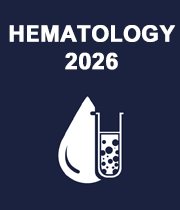Title : Effect of DMT1 gene mutation on pathophysiology of iron deficiency anemia
Abstract:
Background: Iron deficiency anaemia is the burning health issue of adults as well as children in India, which is evaluated by deficiency in serum ferritin level, mean corpuscular hemoglobin (MCH) and mean corpuscular volume (MCV). DMT1 mutations primarily affect iron utilization and not absorption. Thus, we aimed to evaluate the correlation of clinical pathophsiology and DMT1gene variation in iron deficiency anemia patients.
Methods: A total 140 IDA patients and equal numbers of control were registered for study. Hemogram analysis was done by automated hemato -analyzer while CRP and Serum ferritin test done by ELISA method. ESR test was done as per Wintrobe method. Genotyping of DMT1 gene variation was done by using PCR-RFLP method
Result: Two DMT1gene mutations, namely the IVS4+44C>A and c.2044T>C were analysed. Amongst the patients, 14 were heterozygous for IVS4+44C>A mutation. Twenty-eight patients were heterozygous for c.2044T>C mutation while 08 homozygous for IVS4+44C>A genotype and 9 were homozygous for c.2044T>C genotype. Controls were presenting 12 heterozygous for IVS4+44C>A mutation and 11 heterozygous for c.2044T>C mutation while 4 homozygous were identified for IVS4+44C>A mutation and 5 homozygous were reported for c.2044T>C genotype in IDA patients. Severity of clinical symptoms is worsening in non-mutant.
Conclusion: After studying the DMT1 polymorphism on iron deficiency anemia, the frequency of clinical symptom is found to be less severe in IVS4+44C>A and c.2044T>C mutation. While, finding of this research also showed the IVS4+44C>A and c.2044T>C mutation may be predictor of iron deficiency anaemia and need diagnosis of these DMT1 variants genotype.
Audience Takeaway:
- When investigating microcytosis of unknown origin, in forms of iron deficiency anemia refractory to classical oral or intravenous iron administration, or iron deficiency anemia coexisting with iron overload of different parenchyma organs.
- It is important to genotype the unexplained microcytic ID or IDA so as to avoid unnecessary investigations and iron supplementation which would be deleterious in such cases.
- May have therapeutic implications in terms of targeted therapy e.g use of Hepcidin.
- These genetic forms of iron deficiency anemia could be models to further increase our knowledge concerning iron metabolism and erythropoiesis.
Identifying the specific gene mutations contributing to iron metabolism.
- Would be enormously useful in treatment decisions.
- Genotype-phenotype correlation, leading, in turn, to more accurate genetic counseling regarding prognoses and associated illnesses.
- Each mutation identified would lead to better understanding of the various proteins that interact to regulate iron homeostasis.
- Would allow targeted use of the drug.



